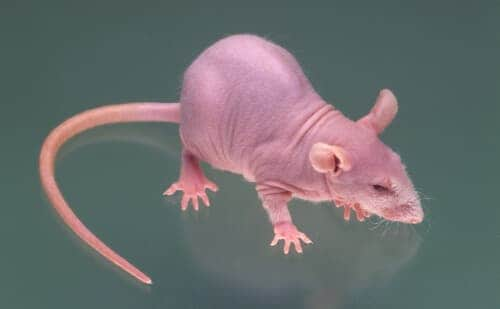F344/NJcl-rnu/rnu
Animals/Immunodeficiency Models/

Ordering name: F344/NJcl-rnu/rnu
Nomenclature: F344/NJcl.Cg-Foxn1rnu
Availability: Live colony
Not genetically modified animal
Characteristics
Because this strain is controlled by the single recessive gene rnu, homozygotes (rnu/rnu) are anatomically athymic and hairless in appearance. Histologically, hair follicles are present, and many animals develop a hair coat at about 6 weeks after birth.
Immunologically, these rats lack T-cell function.
Because rats are larger than nude mice, a greater quantity of tumor cells can be collected, and metastasis may occur depending on the tumor type.
These rats have advantageous features that are not found in nude mice; for example, anticancer drugs can be administered via intravenous injection and tumor cells can be transplanted.
Use
- Various immunology and cancer studies
- Screening of anticancer drugs
- Microbiological studies, etc.
Rearing Management of Immunodeficiency Models
Microbiological control of immunodeficiency model animals should be managed strictly because of their properties. Due caution is necessary against opportunistic infections with normal inhabitant microorganisms as well as microorganisms that are pathogenic in mice and rats.
- Require workers to wear specialized protective clothing that covers all exposed skin and to use respiratory filters.
- Supply boiled and chlorine-added water and autoclaved diet (CL-2).
- Prevent contamination using filter caps and handle animals using tweezers or disposable gloves.
The use of a dedicated rearing room or specialized rearing device is recommended.
Origin
These rats were discovered by chance in a colony of outbred Hooded rats at the Rowett Research Institute and were assigned to the genetic symbol rnu.
The Central Institute for Experimental Medicine and Life Science introduced these rats and backcrossed them with inbred F344/N rats; CLEA Japan subsequently started the production and supply of these animals.
Our Contract Research Services related with This Animal
For details on our contract research services, including cryopreserved embryos, contracted testing, and the provision of research materials such as blood and organs, please click here .
FAQ
What is F344/NJcl-rnu/rnu?
F344/NJcl-rnu/rnu is an immunodeficiency rat model controlled by the single recessive gene rnu. Homozygotes (rnu/rnu) are anatomically athymic and lack functional T-cell activity.
What are the immunological characteristics of this strain?
These rats lack T-cell function. They are anatomically athymic and appear hairless, although hair follicles are present histologically and many animals develop a hair coat at about 6 weeks after birth.
What advantages does this rat model have compared to nude mice?
Because rats are larger than nude mice, a greater quantity of tumor cells can be collected, and metastasis may occur depending on the tumor type. In addition, anticancer drugs can be administered via intravenous injection and tumor cells can be transplanted.
What is F344/NJcl-rnu/rnu used for?
This strain is used for various immunology and cancer studies, screening of anticancer drugs, and microbiological studies.
What is the origin of the F344/NJcl-rnu/rnu strain?
These rats were discovered in a colony of outbred Hooded rats at the Rowett Research Institute and assigned the genetic symbol rnu. They were introduced and backcrossed with inbred F344/N rats by the Central Institute for Experimental Medicine and Life Science, after which CLEA Japan began production and supply.


